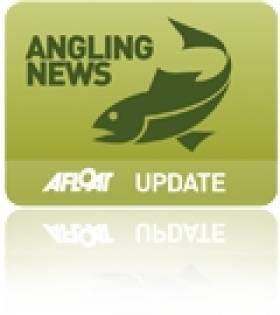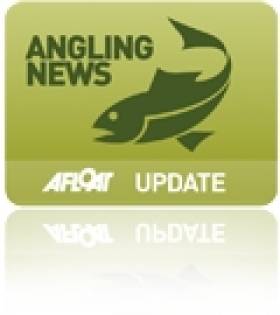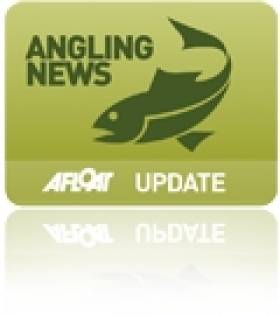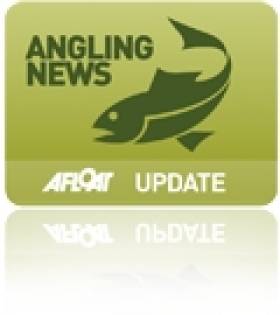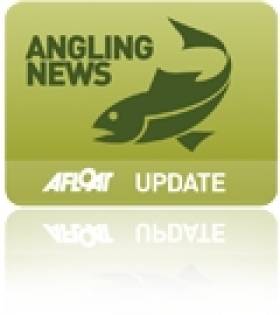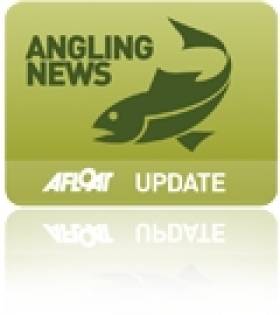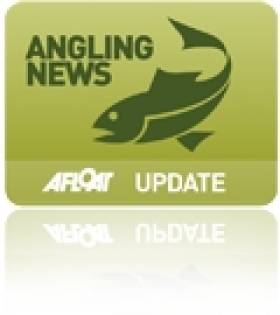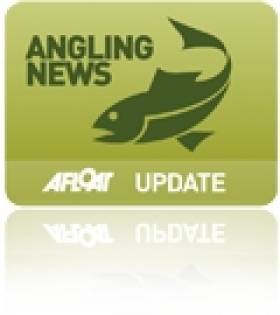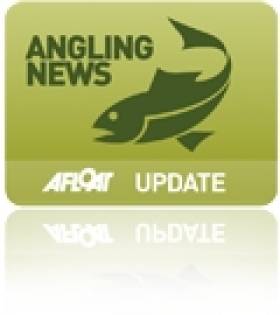Displaying items by tag: angling
Safari Boats Order Boosts Kerry Boat Building Firm
Kerry Boat-builder O'Sullivan's Marine (OSM) is bucking the trend in the depressed marine industry. The Tralee firm have a busy order book and report strong demand for its traditional lake boat marque but it also has interest in more exotic boats too for the emerging nature tourism market.
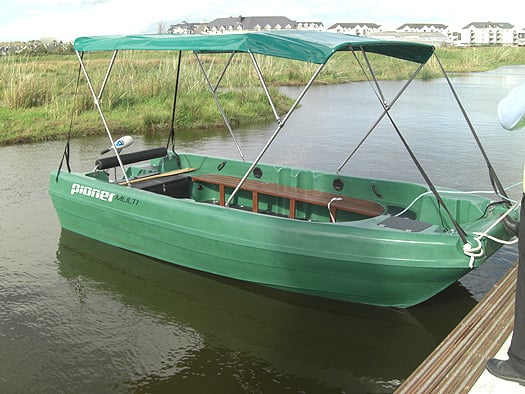
Tried and tested, the new Safari boats are ready for Lee Valley
The first of the orders processed in Tralee is the supply of four Pioner Multi boats with Motor Guide 24v Electric Outboards for the local Lee Valley Development, a new eight hectare (20 acre) eco-tourism development comprising a Nature Park. The four boats will be used for safari-style boat rides.
'We carried out water trials yesterday, all is in order and the fully fitted out boats are being delivered this week', says managing director Brian O'Sullivan.
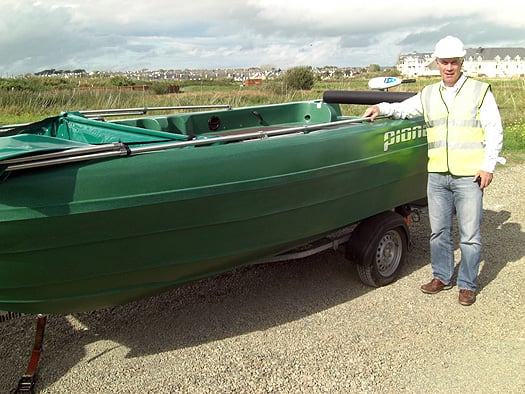
OSM's Brian O'Sullivan with one of the new Pioner boats
OSM, a member of the Irish Marine Federation, is also supplying two lake boats to Creeslough Angling Association in Donegal. Six Irish built boats have also been ordered by Dunfanaghy Angling Association in Donegal. Five more lake boats are also going to Waterville, Co. Kerry. All orders are for November delivery! Recession? What recession?
OSM have a selection of used craft on the boats for sale website. See them here
Slim Pickings for IWA Angling Day
There was a big turnout for the Irish Wheelchair Association's annual Angling Day recently, The Irish Time reports.
As many as 90 competitors, representing 11 angling centres across the country, staked out spots along the Grand Canal at Lucan for the seventh year running.
Gusty conditions on the day resulted in a grand total of zero catches in the three-hour competition - a stark contrast to last year's contest when more than 30 were caught and released.
But the anglers didn't let that get their spirits down, as the day was rounded off with a packed-out barbeque for competitors and volunteers.
The Irish Times has more on the story HERE.
Macroom Man Wins All-Ireland Lake Fishing Title
Daniel Murphy topped a competitive field in the All-Ireland Lake Fishing Championships, the Corkman reports.
Anglers from across the island of Ireland took part in the event on Loch Lein in Killarney, braving the high winds that heralded the arrival of Hurricane Katia.
But Macroom man Murphy - regarded as one of the top lake anglers on the circuit - was not put off by the tough conditions.
He received his award from Munster Trout Angling Council chairman Maurice Willis.
New Angling Resort Makes a Splash
The Irish Times' angling correspondent Derek Evans has good things to say about the new Southern County Fishing Resort in Bagenalstown, Co Carlow.
"Bowled over" by the "45 acres of beautifully landscaped surrounds", Evans was particularly taken by the resort's three lakes, "all stocked with high quality rainbow trout grown from the hatchery on site".
Big catches are plentiful for anglers of all ages and levels of experience. Novices are particularly welcome as bait and rod hire are available.
Speaking at the launch, Minister for the Environment Phil Hogan said: "This type of development is what we need in rural areas to develop a natural product, to love nature and to understand the value of our water resource."
The Irish Times has more on the story HERE.
Proposals to Lift Bass Fishing Ban Cause a Stir
The Government's proposals to lift the ban on commercial bass fishing has raised the ire of at least one letterwriter to The Irish Times.
Guy Pitcher writes in today's newspaper that "the commercial ban has saved this very slow-growing species from otherwise over-exploitation and ruin for decades to come".
He adds: "There is absolutely no hope and no precedent for believing that a commercial bass fishery could be 'sustainable' as it is, regrettably, human nature to grab as much as one can before someone else does."
The Englishman, who fishes regularly in west Cork, argues that any benefit to the economy from commercial fisherman "making a fast buck" is "dwarfed by the long-term sustained benefit from continued angling tourism".
Do you agree that lifting the ban will see a return to overfishing? Or do you think that any measure to assist Ireland's economic growth should be considered? Have your say in the comments below.
Welcome Boon for the River Moy
The New York Times recently paid a visit to the River Moy in Co Sligo, where angling has experienced a resurgance in recent years.
Since the ban on drift netting off Irish shores in 2007, salmon numbers in the Moy have risen to 75,000 annually, according to Inland Fisheries Ireland.
It's a welcome boon for the River Moy, which also suffered the effects of dregding for agricultural purposes in the 1960s which "cripped much of the integrity of the river’s substrata away, creating the equivalent of a featureless canal through much of its course."
Weirs and spawning gravel in tributary streams have helped the Moy to recover some of its former glory, and the river now welcomes thousands of anglers each year - especially to the top spots in Ballina town centre.
The New York Times has more on the story HERE.
Irish Anglers Tough It Out in Tuscany
Team member Joe Byrne, from Courtown in Co Wexford, told the Gorey Guardian that the Irish are "in with a serious chance".
"Ireland won the World Championships last year [in South Africa], so there's a little pressure there. We'll just have to catch a few fish!"
The contest will take place over two-and-a-half weeks on Italy's Mediterranean coastline.
Go Fishing in Ireland - an 'Angler's Paradise'
DiscoverIreland guest blogger Kirsten Fruit has posted a quick guide highlighting Ireland's abundance of world-class angling spots.
"For years, fishing fanatics from around the world have found a haven of sorts in Ireland’s waterways," she writes, "and it isn’t hard to see why."
Ireland has it all, from deep-sea angling for bass or cod to trout or salmon fishing on rivers and lakes.
But it's not just for the experts, as there are many excellent angling guides throughout the country who make a business out of introducing newcomers to the sport.
"Having a guide adds 100 percent to an individual’s enjoyment on the river," says Ballynahinch Castle's master ghillie Simon Ashe.
DiscoverIreland has more on the story, including guides' favourite angling spots, HERE.
Avoca Produces Record Sea Trout
Denis O'Toole has spoken of his amazement at catching a record 16-pound sea trout from the Acova River in Co Wicklow.
The angling hobbyist and professional fly dresser told the Bray People how he had spent the day fishing with a friend in what has been described as 'the most polluted river in Europe' when he spotted the monster, and decided to take up the challenge.
"I went down to the pool where I had previously seen the fish move," he said. "I put on a 1 1/2 inch aluminium tube with a salar single hook (with the barb squeezed down) and started at the head of the pool.
"On my fourth cast while stripping the fly back he hit it with a bang and all hell broke loose; all I could see was white foam on the water through the inky darkness. I thought I had hooked Free Willy."
O'Toole continued: "He was lying in only three feet of water when he took and in total the fight lasted 20 minutes. My fishing partner, Dean Kennedy, netted the fish. He was then carefully weighed and measured and released back to spawn to produce more 16 lb'ers."
The Bray People has more on the story HERE.
Angling in Ireland: What's Your View?
A recent letter to The Irish Times highlights some stark difference between Europe and Ireland as a top angling destination.
Reader Kevin McDonnell from Co Cork recounts a fly-fishing trip in Norway, praising "pristine rivers accessed through open and clean farmyards ... where netting for salmon is illegal, where hydro-electric schemes allow fish to pass and provide a minimum level of water flow, even in dry conditions, to allow for the safe passage of migrating fish."
In contrast, a more recent visit to the ESB salmon fishery at Inniscarra Dam on the River Lee revealed "endless rubbish, discarded fishing line, 20m of large-diameter ESB cable by the river’s edge, bonfires, ragwort and forestry so dense that nothing grows at ground level."
McDonnell also noted the low level of water being released from the "almost full" reservoir above, and what appeared to be high levels of phosphate contamination.
Is Ireland as an angling destination "a joke" as this angler says, or is this just one side of the story? Have your say in the comments below.




























